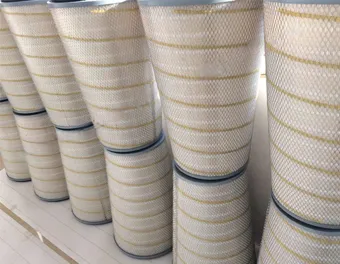 Tel:
+8618931101301
Tel:
+8618931101301
12 月 . 03, 2024 17:40 Back to list
pulse jet cartridge filter
The Efficiency of Pulse Jet Cartridge Filters in Industrial Applications
Industrial processes often generate dust and particulate matter that can pose serious health hazards and environmental concerns. To mitigate these risks, industries utilize various dust collection systems, with the pulse jet cartridge filter emerging as one of the most efficient and effective solutions. This article explores the workings, applications, advantages, and evolving technologies associated with pulse jet cartridge filters.
What is a Pulse Jet Cartridge Filter?
A pulse jet cartridge filter is a type of air pollution control device specifically designed to capture airborne particulates. It comprises a series of cylindrical filter cartridges housed in a filter chamber. As air laden with dust enters the chamber, it passes through the filter cartridges, where particles are trapped on the surface while clean air exits. The filtering process is enhanced by the pulse jet cleaning mechanism, which employs bursts of compressed air to dislodge accumulated dust from the filter surfaces.
How Do They Work?
The operation of a pulse jet cartridge filter is straightforward yet effective. Air containing particulates enters the filter chamber through an inlet. The velocity of the incoming air causes it to pass through the filter media, which can be made from various materials, including polyester, polypropylene, or Teflon, depending on the application. Once the air passes through the filter, the larger particles are captured on the surface, while the clean air exits the system.
As dust accumulates on the cartridge, the pressure drop across the filter increases, necessitating cleaning to maintain efficiency. At scheduled intervals, a control system triggers a pulse of high-pressure air to be injected into the cartridge, lifting the dust off the filter surface and into a hopper for disposal. This process allows for continuous operation with minimal downtime and maintains optimal airflow.
Key Advantages
The efficiency of pulse jet cartridge filters stems from several key advantages
1. High Filtration Efficiency These filters can achieve high removal efficiencies, capturing 99% of particles, including fine dust, which is crucial for maintaining air quality in industrial settings.
pulse jet cartridge filter

2. Compact Design Compared to traditional baghouse systems, pulse jet cartridge filters are more compact, making them suitable for facilities with space constraints while providing the same or superior performance.
3. Low Operating Costs The efficient cleaning mechanism reduces the need for frequent cartridge replacements and minimizes energy consumption, leading to lower operating costs.
4. Versatility They can be used in a wide range of applications—from woodworking and food processing to chemical manufacturing and metalworking—adapting to various particulate sizes and compositions.
5. Enhanced Safety By controlling dust emissions, these filters drastically reduce the risk of respiratory health issues among workers and comply with environmental regulations, contributing to a safer workplace.
Evolving Technologies
Recent advancements have further enhanced the performance and functionality of pulse jet cartridge filters. Innovative materials are being developed to improve filtration efficiency and resistance to aggressive chemicals and high temperatures. Additionally, smart technology integration allows for real-time monitoring of filter conditions, enabling predictive maintenance and reducing operational interruptions.
Automation in cleaning cycles has improved efficiency, ensuring that filters are only cleaned when needed. This not only preserves the integrity of the filter media but also conserves energy. Moreover, advancements in computational fluid dynamics (CFD) simulations aid in the design of optimized filter configurations, enhancing airflow dynamics and particulate capture efficiency.
Conclusion
In summary, pulse jet cartridge filters represent a pinnacle of dust collection technology, offering efficient, compact, and cost-effective solutions for industries facing particulate matter challenges. As environmental regulations become more stringent and industrial processes evolve, these systems will continue to play a vital role in promoting cleaner air and safer working environments. The commitment to ongoing technological innovation ensures that pulse jet cartridge filters will remain at the forefront of air pollution control technology for years to come.
-
How to choose a high-efficiency air filter? Here comes a professional guideNewsOct.21,2024
-
Air filter: multi-field application, protecting fresh airNewsOct.17,2024
-
Carbon air filter: a green guard to protect air qualityNewsOct.16,2024
-
Can activated carbon completely remove indoor odors and pollutants in air purification?NewsOct.14,2024
-
How to filter air efficiently and ensure indoor air quality?NewsOct.12,2024
-
Activated carbon filter: the invisible guard of clean water lifeNewsOct.11,2024

 Email:
Email:





